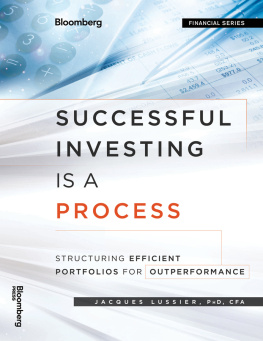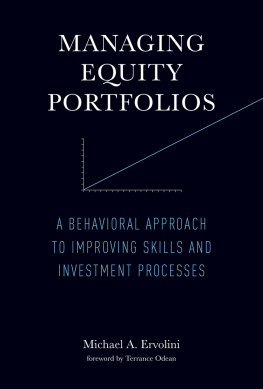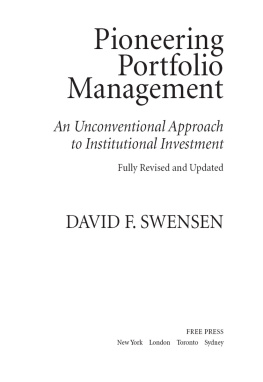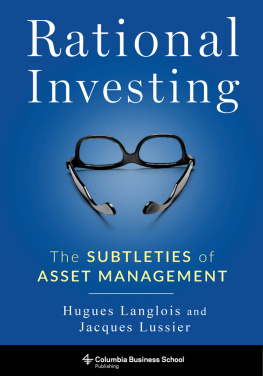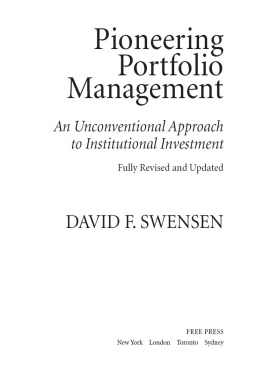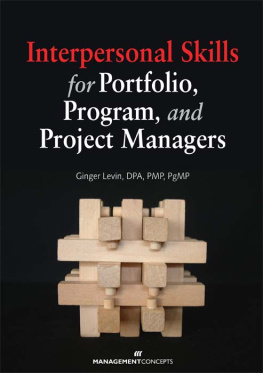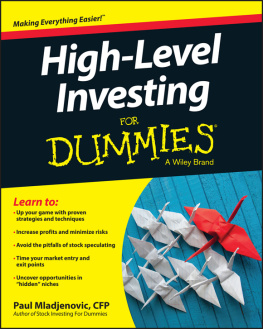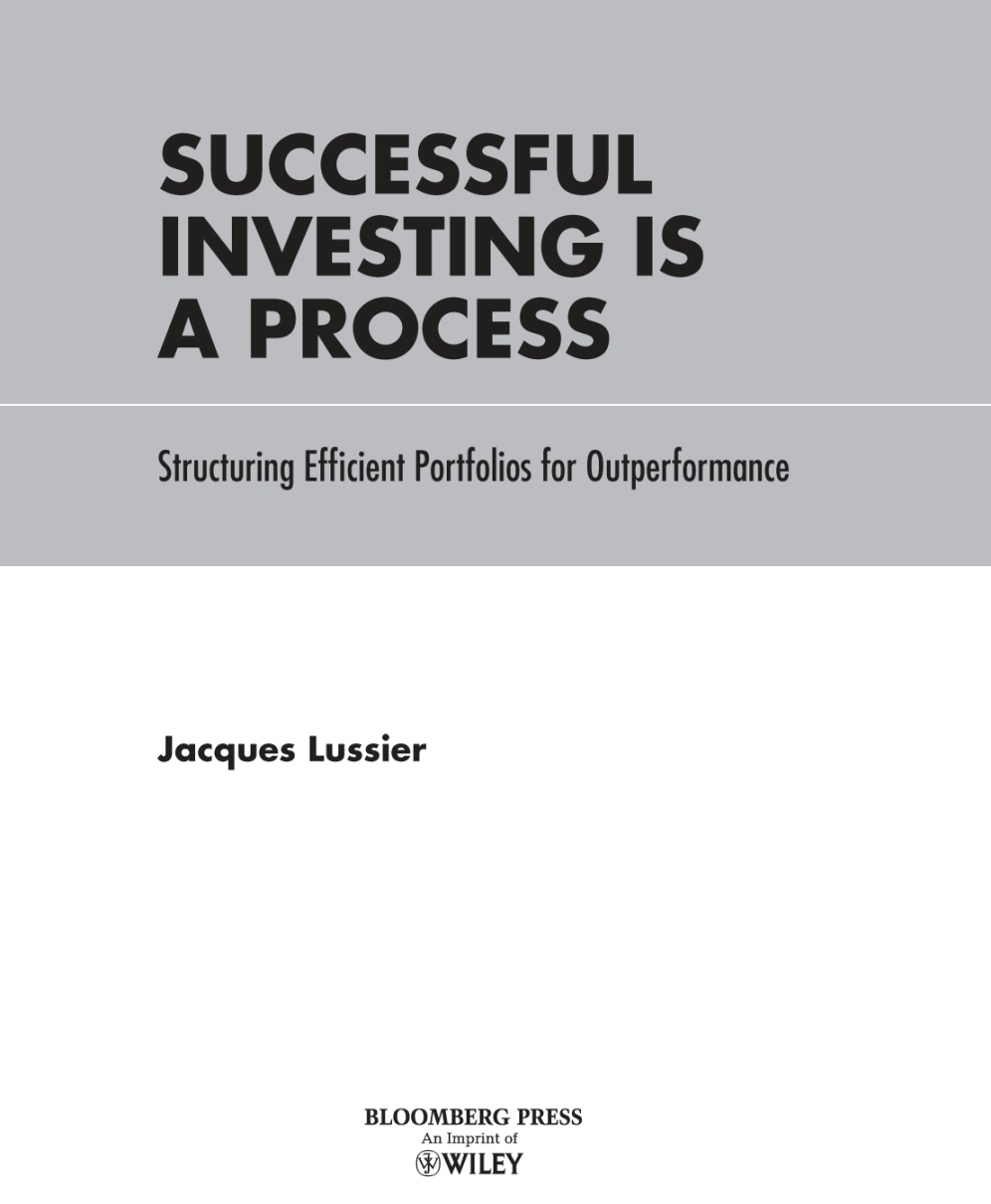
Since 1996, Bloomberg Press has published books for financial professionals on investing, economics, and policy affecting investors. Titles are written by leading practitioners and authorities, and have been translated into more than 20 languages.
The Bloomberg Financial Series provides both core reference knowledge and actionable information for financial professionals. The books are written by experts familiar with the work flows, challenges, and demands of investment professionals who trade the markets, manage money, and analyze investments in their capacity of growing and protecting wealth, hedging risk, and generating revenue.
For a list of available titles, please visit our web site at www.wiley.com/go/bloombergpress.
Copyright 2013 by Jacques Lussier
All rights reserved. No part of this work covered by the copyright herein may be reproduced or used in any form or by any meansgraphic, electronic or mechanicalwithout the prior written permission of the publisher. Any request for photocopying, recording, taping or information storage and retrieval systems of any part of this book shall be directed in writing to The Canadian Copyright Licensing Agency (Access Copyright). For an Access Copyright license, visit www.accesscopyright.ca or call toll free 1-800-893-5777. For more information about Wiley products visit www.wiley.com.
Care has been taken to trace ownership of copyright material contained in this book. The publisher will gladly receive any information that will enable them to rectify any reference or credit line in subsequent editions.
The material in this publication is provided for information purposes only. Laws, regulations, and procedures are constantly changing, and the examples given are intended to be general guidelines only. This book is sold with the understanding that neither the author nor the publisher is engaged in rendering professional advice. It is strongly recommended that legal, accounting, tax, financial, insurance, and other advice or assistance be obtained before acting on any information contained in this book. If such advice or other assistance is required, the personal services of a competent professional should be sought.
Library and Archives Canada Cataloguing in Publication Data
Lussier, Jacques
Successful investing is a process : structuring efficient portfolios for outperformance / Jacques Lussier.
Includes bibliographical references and index.
Issued also in electronic formats.
ISBN 978-1-118-45990-4
1. Investments. 2. Portfolio management. 3. Finance, Personal.
I. Title.
HG4521.L8627 2013 332.6 C2012-906769-5
ISBN 978-1-118-46478-6 (eBk); 978-1-118-46479-3 (eBk); 978-1-118-46480-9 (eBk)
John Wiley & Sons Canada, Ltd.
6045 Freemont Blvd.
Mississauga, Ontario
L5R 4J3
Acknowledgments
I always say Successful Investing Is a Process is the one book I wish I could have read a long time ago, although even with the intent, I doubt it could have been written prior to 2007. So much relevant research has been completed in the last decade. Sadly, it also took the hard lessons learned from a financial crisis of unprecedented proportion in our generation to allow me to question some of my prior beliefs and thus enable and motivate me to write it over a period of more than two years. This book is not about the financial crisis, but the crisis did trigger my interest in questioning the value and nature of services provided by our industry with the hope that some changes may occur over time. It will not happen overnight.
Like most books, it is rarely completed without the help and encouragement of colleagues, friends and other professionals. I must first thank Hugues Langlois, a former colleague and brilliant young individual currently completing his Ph.D. at McGill University, for helping me identify the most relevant academic articles, review the integrity of the content and execute some of the empirical analyses that were required. His name appears often throughout the book. I must also thank Sofiane Tafat for coding a series of Matlab programs during numerous evenings and weekends over a period of eight months.
As I was completing the manuscript in 2012, I was also lucky enough to have it evaluated by a number of industry veterans. Among them, Charley Ellis, Nassim Taleb, Rob Arnott, Yves Choueifaty, Vinay Pande, Bruce Grantier, Arun Murhalidar, as well as several academicians. Some of these reviewers also provided me with as much as ten pages of detailed comments, which I was generally able to integrate into the book. Most of all, I considered it significant that they usually agreed with the general philosophy of the book.
I must not forget to thank Karen Milner at Wiley and Stephen Isaacs at Bloomberg Press for believing in this project. I probably had already completed eighty percent of its content before I initially submitted the book for publication in early 2012. I must also thank other individuals at Wiley that were involved in the editing and marketing: Elizabeth McCurdy, Lucas Wilk and Erika Zupko. Going through this process made me realize how much work is involved after the initial unedited manuscript is submitted. I was truly impressed with the depth of their work.
Finally, a sincere thank you to my wife Sandra, who has very little interest in the world of portfolio management, but nevertheless diligently corrected the manuscript two times prior to submission and allowed me the 1800 hours invested in this project during evenings, weekends and often, vacations. I hope she understands that I hope to complete at least two other book projects!
Preface
In principle, active management creates value for all investors. The financial analysis process that supports proper active management helps promote greater capital-allocation efficiency in our economy and improve long-term returns for all. However, the obsession of many investors with short-term performance has triggered, in recent decades, the development of an entirely new industry of managers and researchers who are dedicated to outperforming the market consistently over short horizons, although most have failed. Financial management has become a complex battle among experts, and even physicists and mathematicians have been put to the task. Strangely enough, the more experts there are, the less likely we are to outperform our reference markets once fees have been paid. This is because the marginal benefit of this expertise has certainly declined, while its cost has risen. As Benjamin Graham, the academician and well-known proponent of value investment, stipulated in 1976: I am no longer an advocate of elaborate techniques of security analysis in order to find superior value opportunities... in light of the enormous amount of research being carried on, I doubt whether in most cases such extensive efforts will generate sufficiently superior selections to justify their cost [1]. If these were his thoughts 35 years ago, what would he say now?
Forecasting the performance of financial assets and markets is not easy. We can find many managers who will attest to having outperformed their reference markets, but how do we know that their past successes can be repeated, or that their success was appropriately measured? How many accomplished managers have achieved success by chance and not by design, or even have achieved success without truly understanding why? Much of the evidence over the past 40 years says that:
Next page
